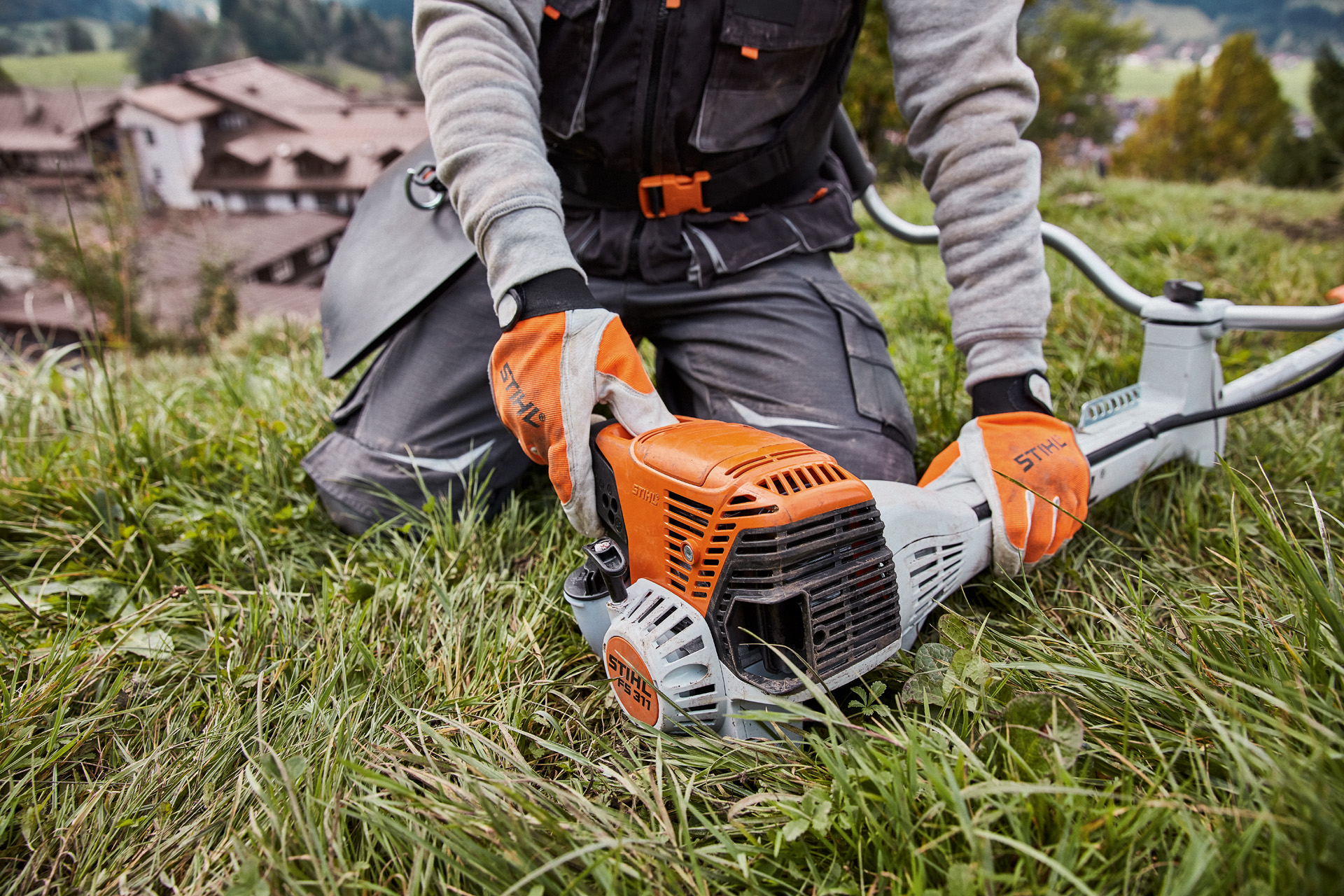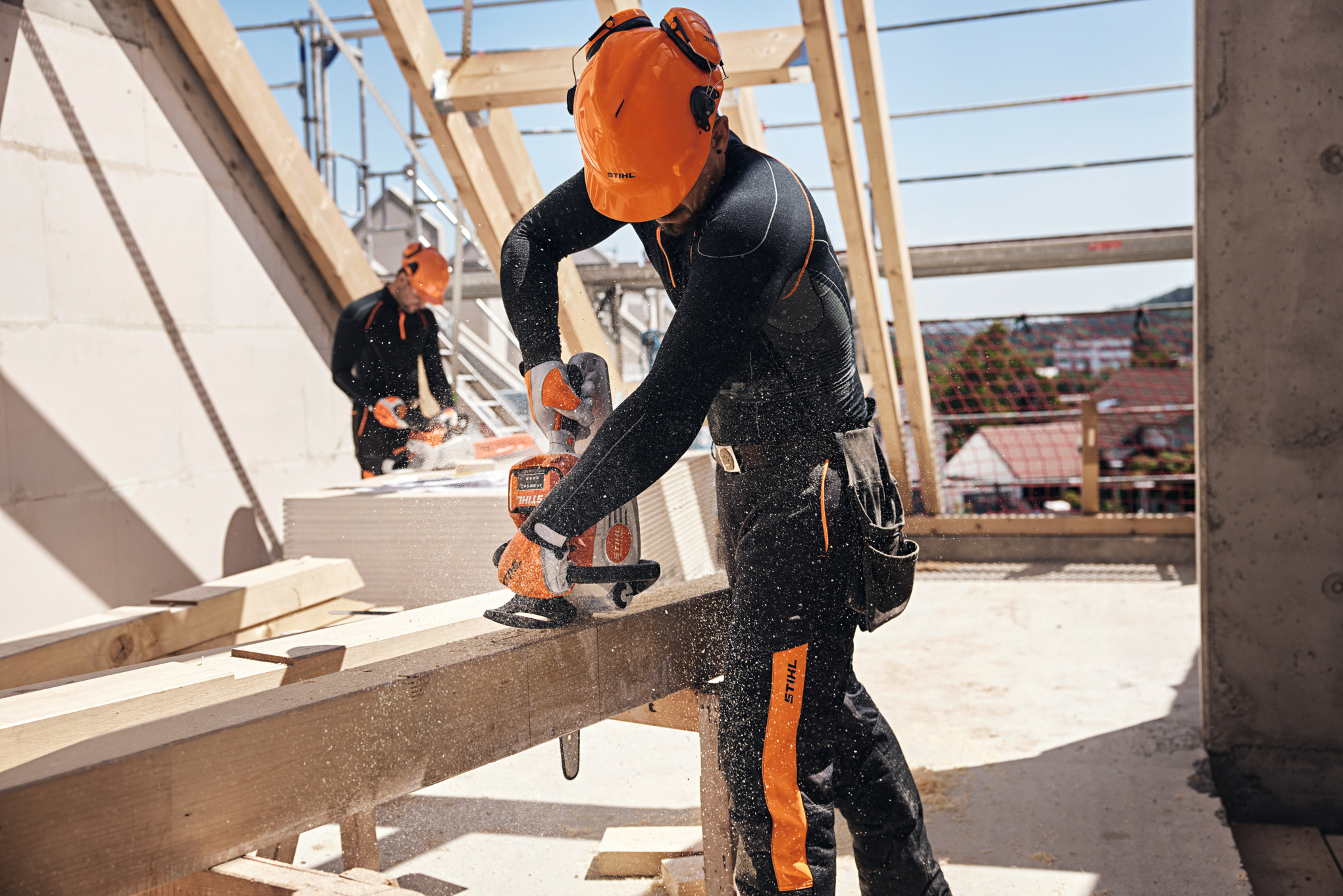The decompression valve: start your petrol chainsaw with ease
The STIHL decompression valve releases compression to make starting your chainsaw significantly easier.
20.09.2024

What is a decompression valve?
Your engine cylinder contains a mixture of gases. When you start your tool manually, this mixture needs to be under some compression for ignition to succeed – but excess pressure requires you to put a lot more effort into starting the engine. That’s because, when you pull the starter cord, you move a piston inside the cylinder to progressively compress the fuel-air mix, thereby increasing the internal pressure. Manually countering this pressure takes considerable effort, but a decompression valve reduces both pressure and effort by releasing some gases before you start. Engines can be fitted with decompression valve systems that are activated in different ways.

Basic functions of each engine
Not all combustion engines feature a decompression valve, but all work on the same principle: a mixture of fuel and air is drawn through the cylinder and into the combustion chamber, where it is put under significant pressure and then ignited. This process moves a piston, which continues the compression and ignition process while also working with the connecting rod and the crankshaft to convert the stroke motion of the piston into a rotation of the crankshaft. This stroke can then drive additional components, e.g. a saw chain on a STIHL chainsaw.
The decompression valve
doesn’t have an electric starter. That’s because you need to compress the fuel-air mix to a pressure of several bar, first overcoming the mass inertia of the crank mechanism. The larger the stroke motion of the engine, the more power you will need to do this. To make the starting process faster and easier, we have developed a decompression system that is based on a small but effective component: the STIHL decompression valve.
How does the STIHL decompression valve work?
Decompression means better starting
Opening a decompression valve releases gas to ensure that peak pressure as you start the engine is reduced. This compression release means less effort when starting your chainsaw or other tool. As soon as the engine ignites, the decompression valve closes again; compression increases; and the start-up momentum of the cylinder initiates normal combustion operation so you experience full engine performance.
A closer look at the STIHL decompression valve
In everyday use, you open the decompression valve on your STIHL chainsaw manually before starting it. The decompression valve opens into the combustion chamber and reduces the compressor stroke’s peak pressure, meaning less power is needed for start-up. In other words, with the decompression valve it takes less effort to move the piston in your chainsaw engine. During this process, the remaining fuel-air mix in the cylinder is dimensioned to ensure that the tool starts reliably whether the engine is cold or warm. The decompression valve then closes automatically to ensure maximum power output under all operating conditions. Your STIHL power tool runs with great performance as ever – but you need considerably less power when pulling the starter cord to get it going..
Decompression system types
There are three decompression valve types available, which are activated in different ways. Below is an overview of the different systems for chainsaw compression release.
A decompression lever is a purely manual device that you use to actuate the decompression valve in the cylinder head. The decompression lever works by means of spring tensioning, requiring you to pull or push it as you start the tool; with the valve open when you activate the starting mechanism on your engine (such as the starter cord on the 2-stroke engine of a chainsaw or boat, or a kick starter or pedal on a moped), compressed gases are diverted out of the cylinder head and the engine can be started with ease. Once the engine has started you must release the lever to close the decompression valve so the engine can function as compression builds up again.
This decompression solution only requires you to manually open the decompression valve before you start the engine. The valve then closes automatically when the cylinder head starts to move. This mechanism ensures optimal fuel mix density as well as the simplest possible handling of the machine. All newer STIHL chainsaws with decompression valves use this semi-automatic system.
Fully automatic STIHL engine decompression systems are used in our 4-MIX® engines and lawn mower engines, for example. When starter revolutions begin, the inlet valve opens automatically, and is then closed again by the action of centrifugal force weights when the starter revolution speed is exceeded.

Can decompression valves be retrofitted?
In principle, yes they can. If your STIHL chainsaw has a blind plug on the cylinder, you can assume it can be used to retrofit a decompression valve. Your STIHL dealer will be pleased to help you further.
Summary: the STIHL decompression valve:
- The STIHL decompression valve releases gas to reduce peak compression pressure in the cylinder of your chainsaw
- The STIHL decompression valve makes it easier to start engines that use pull cords
- Engines may be fitted with manual, semi-automatic or automatic decompression valve systems
- All STIHL decompression valves close automatically after the engine starts
- Decompression valves can be retrofitted in STIHL tools that are appropriately equipped





